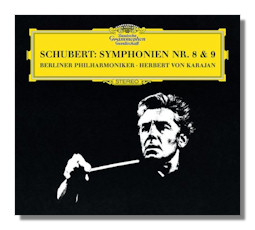
The Internet's Premier Classical Music Source
Related Links
- Schubert Reviews
- Latest Reviews
- More Reviews
-
By Composer
-
Collections
DVD & Blu-ray
Books
Concert Reviews
Articles/Interviews
Software
Audio
Search Amazon
Recommended Links
Site News
 CD Review
CD Review
Franz Schubert

Master Recordings, Vol. 7
- Symphony #8 "Unfinished", D. 759
- Symphony #9 "The Great", D. 944
Berlin Philharmonic Orchestra/Herbert von Karajan
Deutsche Grammophon 4777162
I missed this release when it first appeared and curiously for a critic who finds the most pleasure in Romantic-era music, I've reviewed very little Schubert at all. This lovely disc shows Herbert von Karajan at his absolute mid-career peak, his relationship with the Berlin Philharmonic at its high-water mark. Schubert was one of those composers that Karajan recorded less frequently than most of the German Romantics, but on both DG and EMI/Warner, his efforts have been justly praised.
In "The Great", Deutsche Grammophon has been incredibly lucky. Every one of the label's efforts in this music has gotten some kind of praise. To summarize, Furtwängler's is one of his finest achievements ever, Böhm's – twice – are excellent, as are those of Bernstein, Jochum, Abbado, etc. James Levine's recent live performance was something special, and so is this. Karajan recorded this work infrequently (for him), but it meant a great deal to him and he conducted it with unusual care. Whereas the conductor's Beethoven is more about the artist than composer, Karajan's Schubert was a source of concern to the great maestro. As the short blurb inside the folding cover recalls, Karajan felt that he imposed too many of his own ideas on the music.
Curiously, the notes contain a negative review excerpt that seems to agree with that assessment. But Karajan's Symphony #9 is a musical triumph that is refreshingly musical and is certainly a finer tribute to his legacy than some of the recordings he is best known for. Played with almost unfathomable beauty by the Berlin Philharmonic, it is also a reading of great power and urgency. The conductor allows a surprising about of wind and brass detail to join his always reliable strings, and the results all serve the music very well. The first movement is gorgeously introduced, then majestically intense throughout. The Andante is swift and bristles with an underlying tension that is very uncharacteristic of this conductor. Needless to say, it's unexpected from the source. I daresay that the negative reviews stemmed from the expectation that the Philharmonic would simply drown in the music's many beauties. It doesn't happen here, thank God. Gramophone called the reading "light-weight" in 1971, and aside from the fact that few things in Karajan's entire discography qualify for that description, the rustic and dancing Scherzo is anything but. The Finale is noticeably less weighty than Bernstein's latter Concertgebouw reading, but was compared with good reason to Lenny's scorching New York account. Karajan's is similarly driven and very exciting.
In the Unfinished, I find my enthusiasm dimmed. Certainly the beautiful ensemble work remains, but the intensity is missing. In its place is a kind of "we're playing beautiful music beautifully" mentality that robs the music of any real tension. I can certainly appreciate the first-chair playing and genuine understanding of the composer's idiom (although I am less than impressed with some rather glacial phrasing). Considering the enormous competition in this work, the massive yet tepid framework gives the overall impression of being "blandiose". Still, anyone looking for both of these pieces under the great maestro's baton will want this. Most people will.
Copyright © 2014, Brian Wigman




















